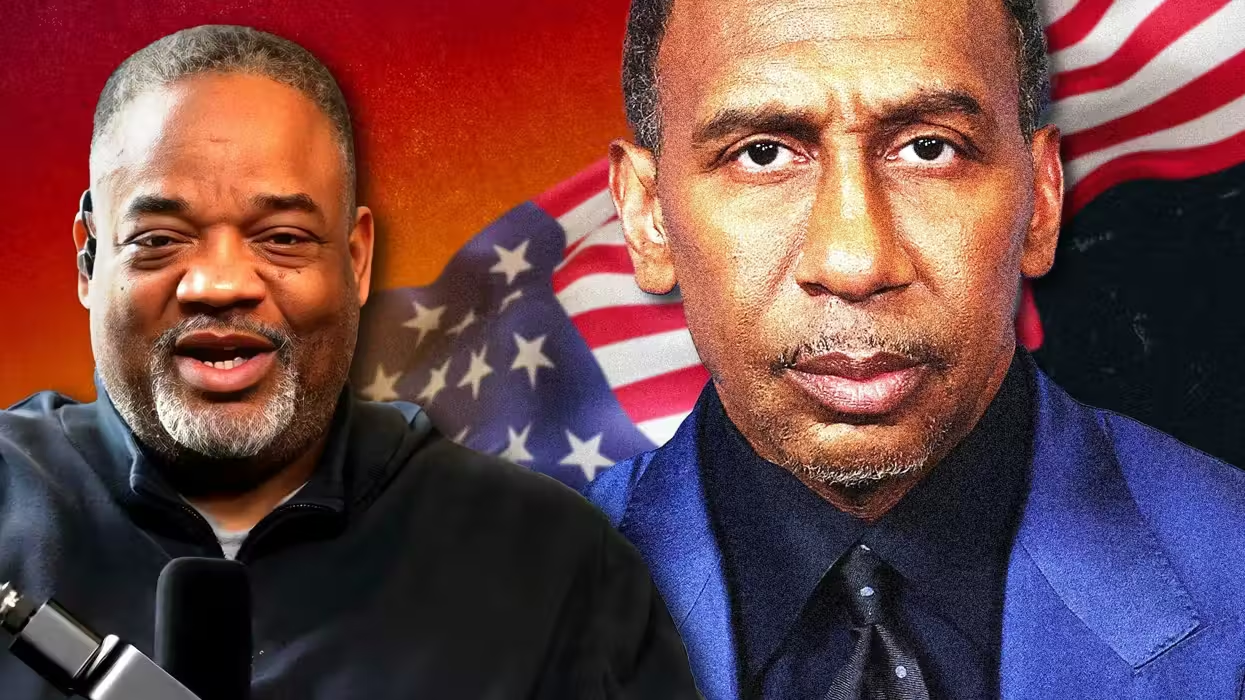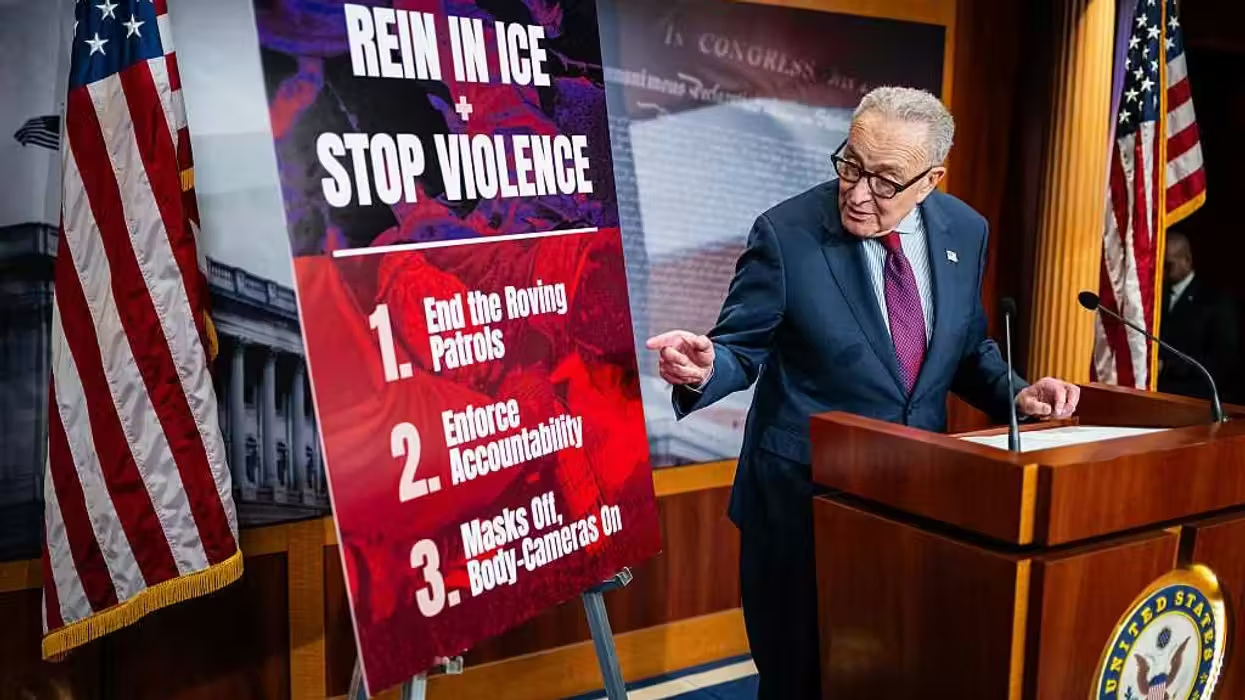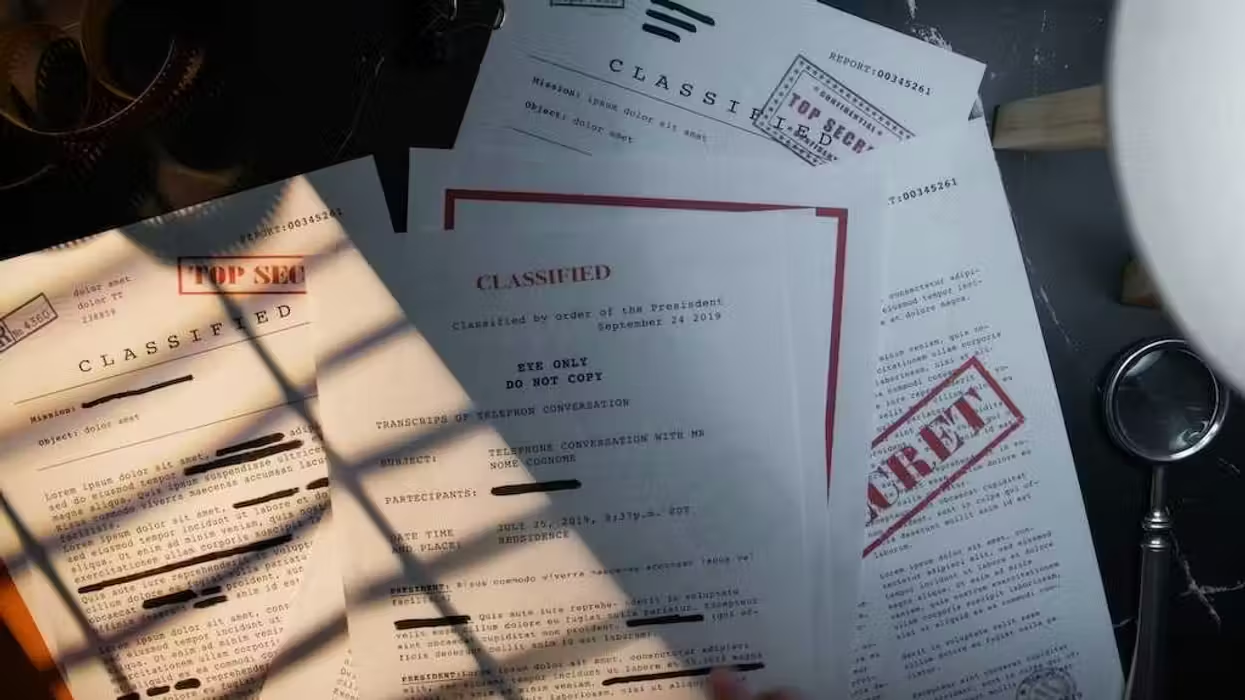© 2026 Blaze Media LLC. All rights reserved.
Exclusive: Historian David Barton Responds to Critics Amid 'Jefferson Lies' Book Controversy
August 13, 2012
"All he did was assemble the wood, throw gas on it and give someone else the match."
This is a part of an ongoing series that TheBlaze has been writing about conservative author and historian David Barton.
Last week, numerous outlets broke the startling news that Thomas Nelson Publishers has canceled conservative historian David Barton's book "The Jefferson Lies." The publishing company is now claiming that the book -- which like many of Barton's projects encountered controversy and intense critique -- has historical errors that were found to render it unsellable. In exclusive interviews with TheBlaze, Barton, one of his primary critics, and a representative from Thomas Nelson shed light on the ongoing controversy.
CONSERVATIVE CRITICS' CLAIMS
The shocking decision to cut both distribution and sales of the book comes on the heels of a plethora of criticism that Barton has received from fellow conservative academics. Warren Throckmorton, a psychology professor at Grove City College, is perhaps the leader of the pack when it comes to conservative evangelicals who have come out against Barton.
Throckmorton regularly blogs about what he sees as errors in the historian's work; he also co-authored a book earlier this year entitled, "Getting Jefferson Right: Fact Checking Claims about Our Third President," alongside professor Michael Coulter. This particular project was a direct reaction to "The Jefferson Lies," and, in many ways, it can be argued that Throckmorton's attention on Barton's work led to Thomas Nelson's decision and to the fury of media attention that has followed.
Among the articles focused on the subject was one that was published in WORLD Magazine. The piece examined the controversy surrounding Barton's views on Jefferson, while noting that some conservatives are growing increasingly worried about the historian's views. It also noted that Jay W. Richards, senior fellow at the Discovery Institute, a right-leaning think tank, like Throckmorton, has apparently taken steps to vet some of Barton's past claims.
 Here's how WORLD described Richards' attempts at verifying the information:
Here's how WORLD described Richards' attempts at verifying the information:
Jay W. Richards, senior fellow at the Discovery Institute, and author with James Robison of Indivisible: Restoring Faith, Family, and Freedom Before It's Too Late, spoke alongside Barton at Christian conferences as recently as last month. Richards says in recent months he has grown increasingly troubled about Barton's writings, so he asked 10 conservative Christian professors to assess Barton's work.Their response was negative. Some examples: Glenn Moots of Northwood University wrote that Barton in The Jefferson Lies is so eager to portray Jefferson as sympathetic to Christianity that he misses or omits obvious signs that Jefferson stood outside "orthodox, creedal, confessional Christianity." A second professor, Glenn Sunshine of Central Connecticut State University, said that Barton's characterization of Jefferson's religious views is "unsupportable." A third, Gregg Frazer of The Master's College, evaluated Barton's video America's Godly Heritage and found many of its factual claims dubious, such as a statement that "52 of the 55 delegates at the Constitutional Convention were 'orthodox, evangelical Christians.'" Barton told me he found that number in M.E. Bradford's A Worthy Company.
But despite skeptics unleashing their criticism -- and joining many liberal commentators who have done the same -- the historian is doubling down and defending his record.
THOMAS NELSON & BARTON RESPOND
Last week, The Tennessean was among the outlets to announce that Thomas Nelson was pulling "The Jefferson Lies" off shelves over "historical errors." Without going into detail, Casey Francis Harrell, director of corporate communications for the company, said that "a number of complaints" about the book led to the decision.
"Because of these deficiencies, we decided that it was in the best interest of our readers to cease its publication and distribution," she said. TheBlaze reached out to the communications director to get more information about these errors and we received an e-mail reply from Harrell on Friday.
According to Harrell "several people have contacted the company since the book’s publication date in April." Following these complaints, she said that Thomas Nelson was working to sort out which items were "matters of opinion and interpretation." So, the publishing team entered into a review process that lasted several weeks.
"During our review we learned that there were some historical details included in the book that were not adequately supported," she wrote, going on to say -- as the had told The Tennessean -- that this was the basis of canceling the book.
Assuming that the book was vetted by the publisher prior to publication, TheBlaze asked for details surrounding the process "The Jefferson Lies" went through. Harrell said that the company does, indeed, fact check, but that it also relies on the author's expertise. That in mind, she offered few explicit details.
"We do have a careful editing process that we confidently use with every book we publish, as well as relying on the expertise of our authors concerning their subjects," Harrell explained. "It is extremely rare that the company would have to withdraw a book from the market based on concerns about its content."
But Barton told TheBlaze that Thomas Nelson was heavily involved in the book's editing process. He described a scenario in which editors reached out to him and actively checked his facts out before the book went to print.
"They questioned and we sent them the documentation," he said, describing a large carton of documents that was, at one point, shipped to the publisher.
Interestingly, when TheBlaze asked Thomas Nelson how much of the book appeared to be problematic and which facts and posited ideas were based in untruth, Thomas Nelson declined to share this information. Harrell did say, though, that Barton, in phone and e-mail, "seemed to understand" the company's decision.
However, this characterization was very different from the scenario that Barton, himself, described. In The Tennessean, he simply said that he received an e-mail notifying him of the cancellation. In an interview with TheBlaze, he expanded upon the process, describing his surprise in detail.
"[Thomas Nelson] had their publicity department call me and say, 'What do you think about Throckmorton’s book? That was where it was left," he said. "Next thing I heard – maybe five weeks later – I get a real curt email saying, 'We lost confidence.' I barely got notification before it hit the press."
BARTON'S RESPONSE TO ACCURACY OF 'THE JEFFERSON LIES'
Barton seemed anything but shaken by the controversy when he spoke via telephone with TheBlaze. He freely answered questions about the controversy and explained that he's prepared to respond to some of the critiques, while dismissing what he believes is an "elevated level of hostility that's not really rational in many ways."

While he stands by his central arguments about Jefferson, Barton isn't pretending to be immune from error. The historian said that the book has already gone through three or four printings and that there have been word and text changes based on spelling or grammar errors along the way. Also, he addressed a willingness to amend historical items, should they be pointed out and proven wrong by other academics.
"Our policy from day one on every book we’ve done [is] that if someone shows us valid things to change, we’ll change them," Barton said.
He went on to explain that if only one percent of the 5,000 facts that were included in his book are incorrect, that would mean that 50 facts could be viably challenged. But he maintained that he and his research staff work hard to verify and back up each and every tidbit he writes and speaks.
While Barton is perfectly willing to fix errors, he believes that many of the items being raised by Throckmorton, among others, are simply overblown and -- also -- wrongheaded. He says that the next edition of "The Jefferson Lies" will have changes and additions: many of them will include more sourcing to corroborate his claims in the book (and disprove some of Throckmorton's views).
"Throckmorton created an atmosphere for people to chime in," Barton explained, when discussing who complained about the book and petitioned Thomas Nelson to pull it (Throckmorton has denied doing so). "All he did was assemble the wood, throw gas on it and give someone else the match."
THROCKMORTON'S VIEWS ON BARTON
Though he admitted that it could put his "evangelical credentials at risk," Throckmorton told TheBlaze that, up until about two years ago, he didn't know much at all about Barton. But, over time, the professor -- believing in the importance of academic integrity -- started vetting Barton's work.
After receiving an advanced copy of "The Jefferson Lies," Throckmorton began to dig in to it, looking at the facts to see what was true and what, in his view, simply wasn't. He explained that everyone -- both liberals and conservatives -- always seems to want the nation's third president on his or her side of the aisle, specifically when it comes to the church versus state debate.
"For me, playing WWJD with Jefferson, whether you're on the right or left --it only goes so far. It's difficult to know what [the Founders] meant and what happened to them," he said. "We’re a way different country than they [were] then."

As for Barton's book, Throckmorton said that he found many of the facts to be off-base. As an academic, he made it clear that he believes intensely in the value and power of "facts." As a Christian scholar, he added, one should embrace the truth without worrying about which side it benefits or hurts.
"If we don’t have the right facts, we’re going to continue to talk past each-other," he said. "Barton's followers think that if you don’t agree with them then you're against God and you're a liberal person."
Quite the contrary, according to him. He told TheBlaze that he's a "social conservative," going on to say that he's "conservative on most issues." On the theological front, he's also right of center, a factor that makes his stance against Barton that much more fascinating.
So, after intensive research, he published "Getting Jefferson Right" on May 1. Originally, the book was only available in digital, but it has now also come out in paperback. And it is likely that this book -- a direct counterargument waged at Barton -- played a role in Thomas Nelson's inevitable decision.
Rather than an overt and calculated attempt to attack Barton, Throckmorton says that his rebuttal is more rooted in his thirst for truth, particularly when it comes to issues he's passionate about.
"If things interest me and I see that the facts are way different from what’s being portrayed, I’m likely to write about it or speak about it," he explained, "And I just couldn’t believe that some of these claims were being made and accepted by so many people."
THROCKMORTON VS. BARTON: JEFFERSON'S FAITH
So, what are these supposed claims?
As the media continue to cover the debate surrounding "The Jefferson Lies," few journalists, if any, have reached out and interviewed Barton about his responses to the specific charges waged by his critics. On Sunday, TheBlaze had extensive conversations with both Throckmorton and Barton, giving both parties adequate ability to explain and refute allegations.
To begin, it's important to distinguish between the divergent views that Barton and Throckmorton have on Jefferson's theological views. As reported, Barton has a very nuanced explanation of the former president's life and a candid response to characterizations that he was an atheist and/or non-believer.
“The easiest way to explain this — what if I only chose quotes from Ronald Reagan from the time he was a Democrat? Would that be an accurate depiction or not?” Barton asked. “Jefferson had several religious phases. During the last 15 years of his life he started to critique his former beliefs.”
In an earlier interview with TheBlaze, he went on to say that it's unfair to examine the last 15 years of Jefferson’s life and to frame him based upon his behavior during that time, when he lived the first 70 years as a more traditionally-religious man. Ignoring the bulk of Jefferson’s life, Barton believes, isn’t an appropriate way to tackle the history.
Jefferson lived his life as a Christian, Barton said. As far as whether the former president and Founding Father died with the faith he purportedly espoused, Barton is divided. He called such a discussion “a complicated situation.”
“If you believe as many denominations do, ‘once saved always saved,’ you would believe he stayed saved. If you believe that you can lose salvation, you can argue that he could lose it,” he said. “If I could use an Obama phrase, ‘that’s above my pay grade.’ “He didn’t renounce the faith — he still was a great lover of Jesus. He just wasn’t sure Jesus was the divine son of God.
Throckmorton, though, takes a very different view. Of Jefferson's life, he said:
"I think toward the end of his life you’d have to say if it could have been given a label – Unitarian. Jefferson said he thought he might be a sect of one...His religious influences were mainly [Unitarian thinkers]. Earlier in his life, I think he was certainly leaning [toward] Unitarianism. I think another good term is 'theistic rationalist' – Jefferson doesn’t really yield to modern categories of religious sects or denominations. He did not believe in the cardinal doctrines of the faith – deity of Christ or the virgin birth."
Here it is evident that, while Barton sees two different faith experiences coloring Jefferson's life, Throckmorton sees a more streamlined unitarianism.
Tomorrow, TheBlaze will delve into some of the explicit issues that are said to be at the heart of "The Jefferson Lies." We'll also provide Barton's response to each line of critique.
--
RELATED:
- BlazeCast Rewind! Historian David Barton Answers Critics and Takes Questions
- David Barton Part I: An In-Depth Look at the Harsh Criticisms of the Conservative Historian
- David Barton Part 2: Historian Responds to Critics’ Claims, Academics‘ ’Extreme Hostility Toward Faith’ & Obama’s Alleged King George III-Like Behavior
Want to leave a tip?
We answer to you. Help keep our content free of advertisers and big tech censorship by leaving a tip today.
Want to join the conversation?
Already a subscriber?
Billy Hallowell is a digital TV host and interviewer for Faithwire and CBN News and the co-host of CBN’s "Quick Start Podcast."
Billy Hallowell
Billy Hallowell is a digital TV host and interviewer for Faithwire and CBN News and the co-host of CBN’s "Quick Start Podcast."
more stories
Sign up for the Blaze newsletter
By signing up, you agree to our Privacy Policy and Terms of Use, and agree to receive content that may sometimes include advertisements. You may opt out at any time.
Related Content
© 2026 Blaze Media LLC. All rights reserved.
Get the stories that matter most delivered directly to your inbox.
By signing up, you agree to our Privacy Policy and Terms of Use, and agree to receive content that may sometimes include advertisements. You may opt out at any time.






